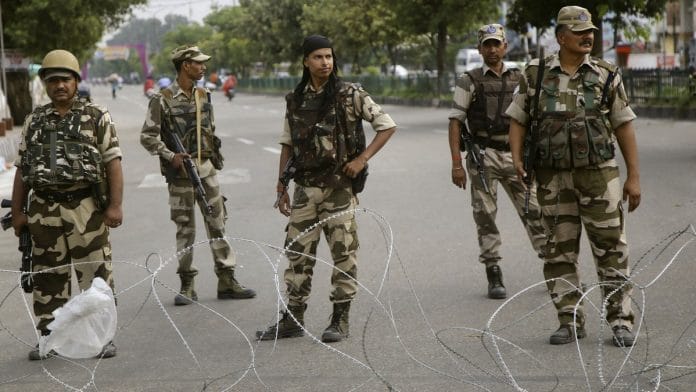New Delhi: The Narendra Modi government’s move to repeal Article 370, which accorded special status to Jammu and Kashmir, elicited considerable response from Pakistani media.
ThePrint takes a look at some of the editorials.
In ‘India’s evil designs in Kashmir’, Pakistan’s Express Tribune observes that the Modi government’s decision came after US President Donald Trump’s statements on Kashmir and developments in Afghanistan, which were progressively “tilting balance in favour of Pakistan”. The perceived threat coupled with the BJP’s “long-cherished dream of Hindutva” led to the abrogation of Article 370, it writes.
Like Express Tribune, Daily Times also addresses the timing of the Modi government’s move and cites “humiliation” after Pulwama and Trump’s Kashmir remark as possible triggers behind the move.
Times, however, does not allow Islamabad to play the victim card. Instead, it says India’s decision should have come as no surprise to the Pakistani government as the BJP has “been shouting about revoking the ‘special status’” accorded to Jammu and Kashmir well before its 2019 re-election.
On the other hand, Pakistan Today terms the Modi administration’s move as “cause célèbre”, attracting attention primarily for the sub-textual intent of changing the “demographic structure” of Jammu & Kashmir as part of its majoritarian agenda.
‘Frankenstein’s monster of presidential decree’
The Nation chronicles the constitutional change to Kashmir’s autonomy in the ‘Darkest Hour’, calling it a “Frankenstein’s monster of presidential decree”.
Appealing to the United Nations for a resolution is futile as most international powers turned their back on the issue of Kashmir years ago, it writes.
Geo News, on the other hand, details Prime Minister Imran Khan’s formal statement on the issue, calling it “illegal”.
While on a phone call with Malaysian Prime Minister Mahathir Bin Mohamad, Khan further said, “India’s move will further deteriorate relations between nuclear-capable neighbours.”
It also cites the Pakistan Foreign Office’s intent to “exercise all possible options to counter the illegal steps” and its plans to vocalise the issue with the international community in the upcoming US delegation meetings.
Meanwhile, China’s Global Times said India’s decision put Jammu and Kashmir in “jeopardy” and was an attempt by the Modi government to “strip Kashmir” of autonomy after it has freely “enjoyed” special status for the last 70 years.
It also cited the Pakistan Foreign Ministry’s strong rejection of India’s move and its insistence that the issue of Kashmir be deemed an “internationally recognised disputed territory”.







1. In context of abrogation of Article 35A and Article 370 of Constitution of India I say that Pakistan has no business to interfere in India’s internal matters. 2. We in India know very well that Pakistan’s display of love for Kashmiris is a classic example of double standards, particularly in view of fact that Pakistan’s citizens are mercilessly killed by terrorists, and killed without any retaliation by either by the police or the military in Pakistan. 3. I also say that the police, military and the entire government administration in Pakistan often appear to be are subservient to terror outfits like Pakistani Taliban, LeT, JuD, and JeM. 4. In connection with the Kashmir issue it is often claimed that Islamists have always viewed Kashmir as a component of global grievances. But when Islamic country like Pakistan is incapable of protecting its own innocent citizens, this claim of global grievance, is I believe, far stretched, and is simply untenable. 5. I wish to know in this context whether even intellectual or one politician from Jammu and Kashmir, including former chief ministers like Farooq Abdullah, Omar Abdullah and Ms Mehbooba Mufti, has ever made a valid suggestion on the Kashmir issue. 6. It is of course easy to say that Kashmiris should have freedom to decide their future but then who will protect them from being driven out their homes by the Pakistan trained terrorists and their fundamentalist supporters? Let me say that the so-called “Islamists’ grievance about Kashmir” reflects a hidden agenda- not of azadi for the Kashmiris but of making them unwanted citizens of an Islamic state called Pakistan.